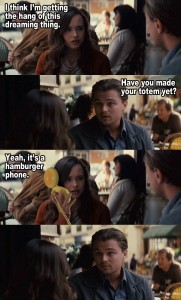Originally appeared in The Peak. I come down a little hard on Inception here, I think. There has been enough fawning praise elsewhere that I think I was subconsciously pushed to point out what I saw to be it’s flaws. I’ll restate because I’m not sure I was clear enough: Inception is the best movie to hit theaters this summer (wide, at least. I hear Winter’s Bone was awesome, and as I’ve said I Am Love was awesome) and one of the best this year. I’ve seen it twice and would see it a third time in a heartbeat.
Christopher Nolan might not be the best director of our time (he comes close), but he certainly is the loudest. Fashioning a strong relationship with Warner Bros. — owner of one of, if not the most effective marketing machines on the planet — Nolan is their newly-minted golden boy in a tenuous situation: we have been talking about Inception for what feels like forever. That amount of hype would bend and break most films, but Nolan, no doubt steeled by helming one of the largest film franchises ever in Batman, just internalized that pressure and made what might be his masterpiece.
Inception is about dreams — the creation of dreams, the manipulation of dreams, and how those dreams can shake and shape us. Leonardo DiCaprio is Dominic Cobb, an extractor of the highest order. He can walk into your brain, steal an idea, and leave without a trace, all while you sleep. When Mr. Saito (Ken Watanabe) hires them to leave a trace via a near impossible process called “inception,†the rewards outweigh the risk. “Don’t think about elephants. Now, what are you thinking about?†remarks Cobb’s partner Arthur, played to perfection by Joseph Gordon-Levitt (Brick, 500 Days of Summer), explaining how true inspiration is impossible to fake. Christopher Nolan seems to agree.
What follows is a delirious trip into multiple planes of reality, a mind-melter that for better or worse will conjure memories of the recent Shutter Island. Cobb enlists the help of a new architect, Ariadne (Ellen Page of Juno, Hard Candy, and Trailer Park Boys fame) and a forger, Eames (Tom Hardy of Bronson, Layer Cake, and Scenes of a Sexual Nature) to break into Cillian Murphy’s (28 Days Later, Sunshine) dreams and convince him to break up an energy conglomerate founded by his dying father.
Inception is, unequivocally, this summer’s best movie (so far, that is — early reports call Edgar Wright’s Scott Pilgrim vs. The World a contender). It’s a dense, thrilling, highly creative film that gives the finger to “dumb fun†films in style. It’s the best money you can spend at a theater right now.
Comparisons to Fellini’s 8 1/2 will abound as it seems as likely an allegory for the filmmaking process as it is a straightforward action picture. Debate roars over the finer points of the film’s message, forcing attentive viewers to discuss the nature of reality, perception, and obsession at length. No matter the answers to the many questions it raises, that it elicits a response other than “that was crap,†makes it stand head and shoulders above this season’s crop.
While exceptional, Inception is not perfect. Complaints are similar to Nolan’s other offerings. The script is Christopher’s baby, with rewrites extending into the early part of the decade. The absence of writing partner and brother Jonathan Nolan is felt in the terse and at times oppressively serious tone of the film. There are a few moments of great levity, but they are few and far between. This becomes an issue during the trademark Nolan, needfully long exposition: gobs of information force-fed (albeit in an exciting manner) to an audience just to enable their enjoyment of the explosive third act. He makes films like a prog-rock song — bounding gallops out of the gate, settling into a lengthy digression on why he is more brilliant than you, frequent bursts of excitement through the fog and an end garnished with fireworks. The Mars Volta should be jealous.
That said, Inception so ably sucks you in you’ll barely notice the cold characterization and minor issues it has. From zero-gravity acrobatics to a homicidal Marion Cotillard flowing through Cobb’s dreams like an assassin, Inception lives up to every bit of hype.
At one point in the film, Ariadne remarks how building a dream is “less about the visual and more about the feel of the dream.†She wonders what happens when she alters the physics of the dream world. That world then literally flips upside down, a city folding onto itself, all spectacle and shock. Looking at what she has done, she says, “it sure is something, isn’t it?†to a similarly moved Cobb. “Yes it is,†he responds quietly. It sure is, Mr. Nolan.
